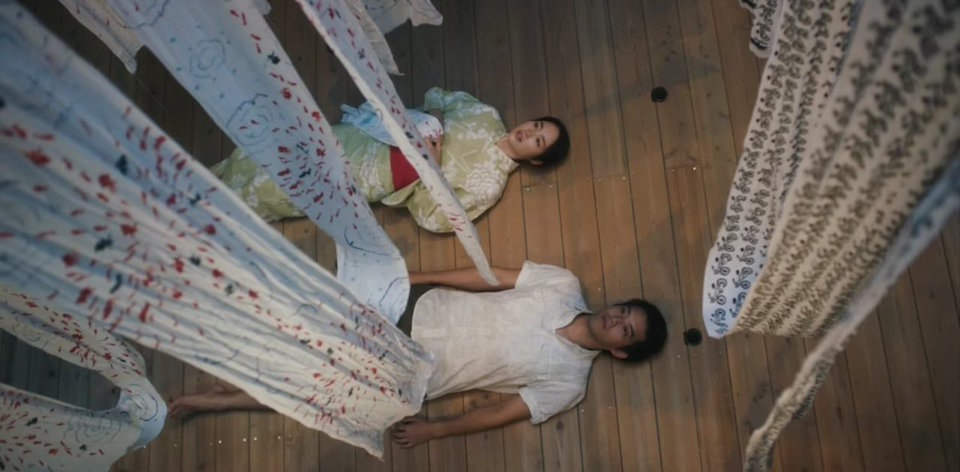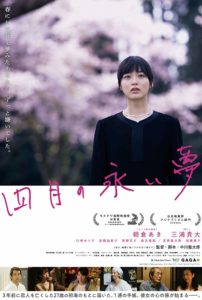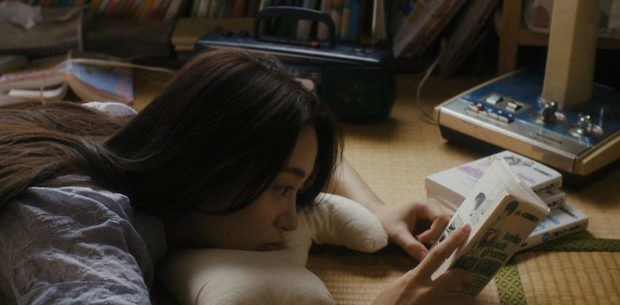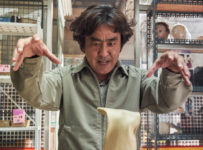After spending August in Tokyo (2014) and watching a Tokyo Sunrise (2015), writer/director Ryutaro Nakagawa slides into a different season with SUMMER BLOOMS (四月の永い夢). Winner of the FIPRESCI award at the 39th Moscow International Film Festival, it is produced by the Tokyo New Cinema collective of indie filmmakers and emblematic of a contemporary wave emerging in Japan.
Nakagawa’s screenplay focuses on Hatsumi Takimoto (Aki Asakura, whose voice you may recognise from The Tale of Princess Kaguya), a women in her late 20s working as a waitress in a suburban Tokyo restaurant. Her listless existence is marked by mourning the suicide death of her boyfriend 3 years earlier, when she gave up her career as a teacher. Hatsumi is forced back into the world through a series of events.
Energetic former student Kaede (Yuriko Kawasaki) enters her life, and latches onto Hatsumi while trying to escape her abusive boyfriend. When the restaurant Hatsumi works at closes down, regular customer Totaro (Takahiro Miura) declares his feelings for her.
The film takes a while to unfold, seemingly going from scene to scene without any genuine sense of direction. This is, of course, emblematic of where Hatsumi is as a character: she’s unmoored, perhaps feeling that she isn’t worthy of being part of a world due to something hitherto undisclosed in her past. For the most part, this is the kind of ‘slice of life’ film that Japanese cinema has excelled at over the last few decades.
Yet as Hatsumi finds her way back into the world, returning home to face some of the past she is running from, Nakagawa peppers his film with some laser-focused scenes exposing her inner thoughts. In the closest thing we get to an overtly romantic scene, Hatsumi and Totaro walk through long strips of fabric. They function as art for art’s sake, literally hanging there to be observed until Totaro casually rips a piece off and hands it to her. “These hand towels are made to be used,” he remarks, and he could just as easily be talking about her emotionally cloistered existence.
The sequence is shortly followed by a long tracking shot of Hatsumi running to the tune of Akaikutsu’s ‘Sho Wo Mochi Bokuha Tabi Ni Deru,’ which is sort of the unofficial anthem for SUMMER BLOOMS, allowing her a moment to break free before abruptly stopping and reflecting on it.
SUMMER BLOOMS is ultimately an understated emotional piece about choosing what feelings we choose to hang onto, and what metrics we use to place value on our societal belonging. As Hatsumi reaches a modicum of catharsis in the final scenes, ‘confessing’ the mistakes of the past in the form of a letter, there’s a sense that she has completed some kind of loop. Now the challenge is to to get that Akaikutsu tune out of your head.
[stextbox id=”grey” bgcolor=”F2F2F2″ mleft=”5″ mright=”5″ image=”null”] 2017 | Japan | DIR: Ryutaro Nakagawa | WRITERS: Ryutaro Nakagawa | CAST: Aki Asakura, Yuriko Kawasaki, Takahiro Miura | DISTRIBUTOR: Tokyo New Cinema (JPN), Japanese Film Festival (AUS) | RUNNING TIME: 93 minutes | RELEASE DATE: October – December 2017 (JFF) [/stextbox]
2017 | Japan | DIR: Ryutaro Nakagawa | WRITERS: Ryutaro Nakagawa | CAST: Aki Asakura, Yuriko Kawasaki, Takahiro Miura | DISTRIBUTOR: Tokyo New Cinema (JPN), Japanese Film Festival (AUS) | RUNNING TIME: 93 minutes | RELEASE DATE: October – December 2017 (JFF) [/stextbox]






